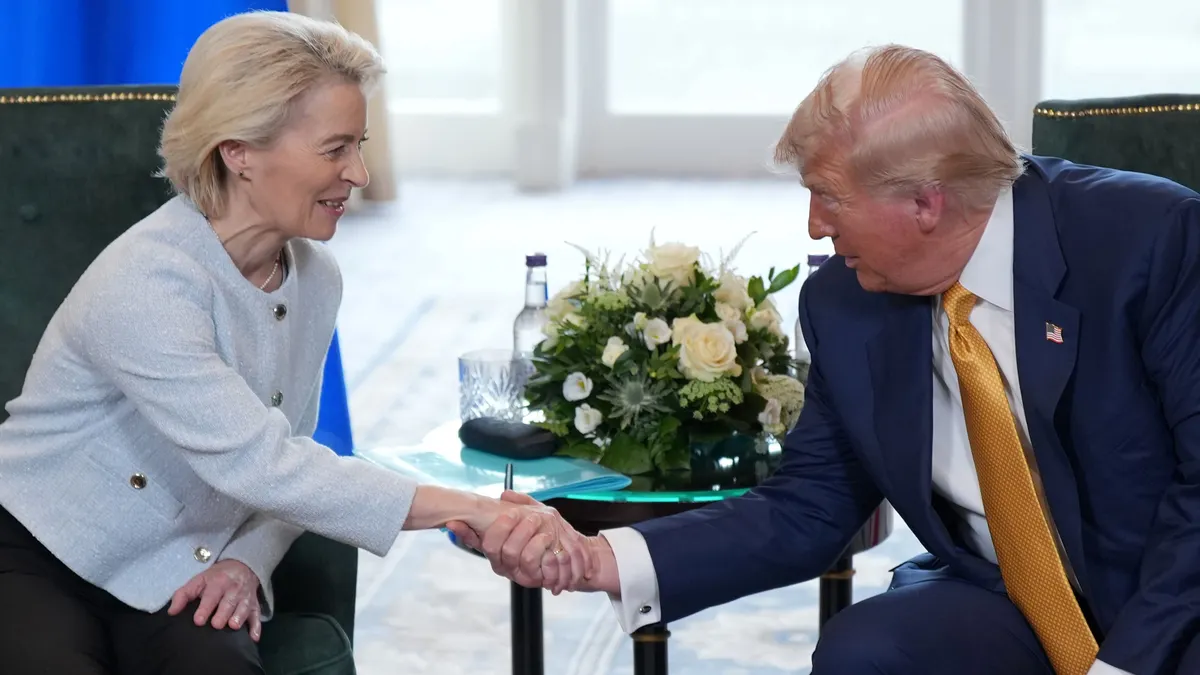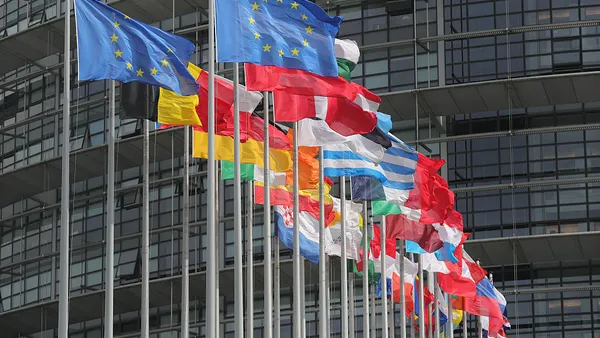Dive Brief:
- The European Union will work to “reduce the administrative burden on businesses” based in the United States in the context of the bloc’s Corporate Sustainability Due Diligence Directive, according to a joint statement released Aug. 21 following the announcement of a framework trade agreement between the EU and U.S. at the end of July.
- The statement, which explained the tariff agreements between the trading partners, included a promise by the EU that neither the CSDDD nor the EU’s Corporate Sustainability Reporting Directive would create “undue restrictions on transatlantic trade.” The EU also committed to “provide additional flexibilities” for U.S. companies regarding its Carbon Border Adjustment Mechanism, which charges import fees on non-EU products based on their carbon emissions.
- For the EU, the declaration comes amid an ongoing simplification effort of its sustainability laws which, the European Commission said in a separate Q&A, shows that reducing administrative burden of the CSDDD and CSRD “is something that the Commission is committed to.”
Dive Insight:
The European Commission proposed an omnibus bill in February that would reduce the number of companies in scope for CSDDD, among other changes. This spring, the European Parliament and European Council legislated a deal to delay reporting for the next wave of CSRD reporting companies and the first wave of CSDDD reporting companies until 2028, while further changes to the laws are worked out.
The joint statement also echoes the omnibus bill’s proposed removal of the EU harmonized liability regime, promising that the EU will propose changes to the “harmonized liability regime for due diligence failures and to climate-transition-related obligations.” This would leave individual EU countries responsible for handling litigation against companies that violate CSDDD or CSRD, and critics argue would make it harder for injured parties to bring such cases.
The EU also said in the trade agreement it recognizes that “the production of the relevant commodities within the territory of the United States poses a negligible risk to global deforestation,” per the statement. It promises to ensure that the EU’s Deforestation Regulation (DR) does not cause “undue impact on U.S.-EU trade.”
The Commission said in the Q&A that “this cooperation does not lead to any changes to EU domestic rules nor will we grant U.S. companies more favourable treatment under this Regulation or any EU Regulation.” However, Richard Gardiner, interim head of EU policy at ShareAction, a United Kingdom-based responsible investment advocacy group, told ESG Dive that the joint statement makes it seems like the EU is “trading away central pillars of its sustainability agenda for short-term concessions.”
“Embedding commitments on CSDDD/CSRD in a trade deal could lock in deregulation for years, making it almost impossible to restore stronger sustainability standards in the future,” Gardiner said in an email.
The joint statement also reflects specific complaints voiced by the members of Congress, Donald Trump’s administration and U.S. companies in recent months.
House Financial Services Chair French Hill, R-Ark., said in February that the CSDDD should be treated as a “non-tariff barrier” for U.S. companies, and in March a Senate bill was introduced to bar U.S. companies from complying with the laws. In April, the official account of the U.S. Trade Representative slammed various pieces of EU legislation in a post on X, formerly Twitter, saying that CBAM “imposes costly verification measures and could reduce US exporters’ advantage in the EU market over high-emissions competitors, namely China,” and would “impact $4.7 billion worth of annual U.S. exports.”
The USTR also claimed that the DR “will potentially impact $8.6 billion worth of annual U.S. agricultural and industrial exports.” In a trade estimate report released in March, the agency raised concerns about several pieces of EU sustainability legislation, including CBAM, DR, Packaging and Packaging Waste Regulation, the Ecodesign for Sustainable Products Regulation and the anti-greenwashing Green Claims Directive, which the Commission proposed nixing in June.
More recently, in a CNBC segment from late June, ExxonMobile CEO Darren Woods called CSDDD “the worst legislation I’ve seen passed anywhere in the world” and said his industry was “advocating to the Trump administration to address this as part of their trade policies.”
The trade deal also includes a promise by the EU to buy “U.S. liquified natural gas, oil and nuclear energy products with an expected offtake valued at $750 billion through 2028,” a move that the European Environmental Bureau, an EU-wide network of citizens’ environmental organizations, said would “derail the EU’s mid-term decarbonisation targets,” according to an official statement. The EEB said it was “calling on the European Parliament and Member States to scrutinise and reject any elements of the agreement that undermine Europe’s climate goals, energy sovereignty, or international credibility.”











